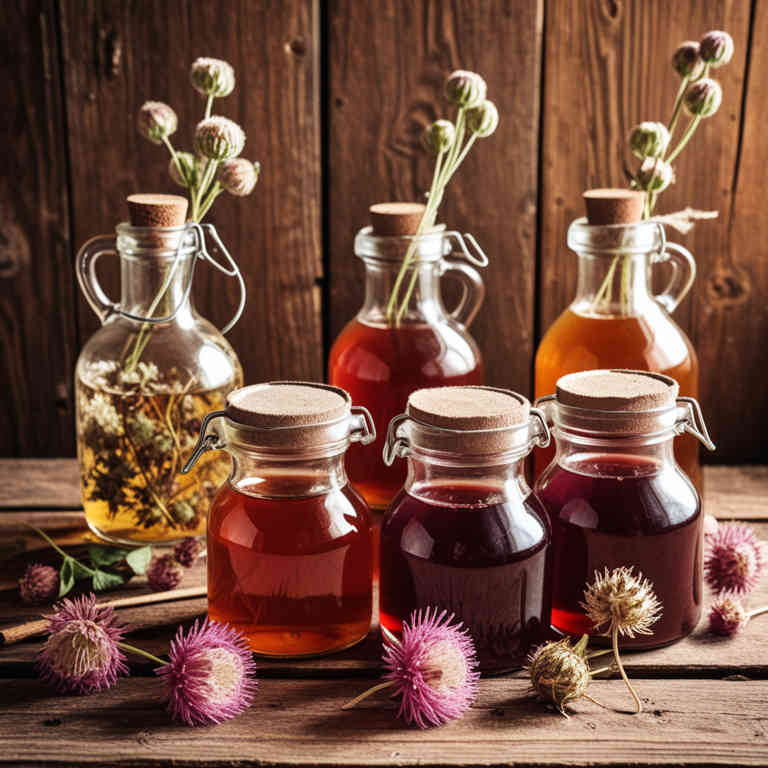Trifolium pratense syrup for medicinal use

Trifolium pratense syrup is a herbal preparation made from red clover, a plant known for its various medicinal properties.
It is typically prepared by extracting the flowers of the plant and combining them with a sweetener and water to create a syrup. In herbalism, this syrup is used to support respiratory health, alleviate menopausal symptoms, and promote skin health due to its rich content of phytoestrogens and antioxidants. It is often recommended for its calming effects and its ability to help with conditions like asthma and skin irritations.
This preparation is valued for its mild nature and versatility in addressing a range of health concerns.
Uses
Trifolium pratense syrup has been used to treat a variety of health conditions for centuries, with its roots tracing back to ancient herbal traditions.
Historically, it was valued in European folk medicine for its purported ability to alleviate symptoms of the common cold, coughs, and digestive issues. Traditionally, the syrup was also believed to have calming effects and was used to support respiratory and cardiovascular health. In modern times, it is often consumed as a natural remedy for sore throats, fever, and inflammation, and is sometimes used in combination with other herbs.
Its popularity continues due to its potential antioxidant and anti-inflammatory properties, though scientific validation of its efficacy remains an area of ongoing research.
Benefits
Trifolium pratense syrup has health benefits such as promoting cardiovascular health, reducing inflammation, and supporting immune function.
It is derived from red clover, which is rich in isoflavones and other phytoestrogens that may help balance hormones. This syrup is also known to alleviate symptoms of menopause, such as hot flashes and mood swings. Its antioxidant properties may contribute to overall cellular health and longevity.
Additionally, it can aid in respiratory health by soothing coughs and reducing mucus production.
Constituents
Trifolium pratense syrup active constituents include flavonoids, particularly quercetin and kaempferol, as well as polyphenols, tannins, and vitamin C. These compounds contribute to its anti-inflammatory, antioxidant, and antimicrobial properties.
The flavonoids help in reducing oxidative stress and supporting cardiovascular health. Quercetin is known for its ability to modulate immune responses and may assist in managing allergies and inflammation.
This syrup is often used to support respiratory health, reduce fever, and alleviate symptoms of colds and coughs.
Preparation
To make Trifolium pratense syrup, start by harvesting fresh red clover flowers, ensuring they are clean and free from pesticides.
Next, gently crush the flowers to release their essential oils and nutrients, then simmer them in a pot with water for about 30 minutes to create a rich infusion. After straining the liquid to remove plant material, add a measured amount of honey or sugar to the infusion and stir continuously until the mixture thickens into a syrup. Finally, store the syrup in a sterilized glass jar in a cool, dark place, where it will keep for several weeks.
This preparation is valued for its potential calming and nutritive properties.
Side Effects
Trifolium pratense syrup may lead to gastrointestinal discomfort, such as nausea, vomiting, or diarrhea, especially when taken in high doses.
It can also cause allergic reactions in individuals sensitive to red clover, which is the primary ingredient. Long-term use may interfere with hormone levels due to its phytoestrogen content, potentially affecting reproductive health. In some cases, it may interact with medications, particularly blood thinners, increasing the risk of bleeding.
It is important to consult a healthcare provider before use, especially for pregnant or breastfeeding women and those with hormone-sensitive conditions.